
Silvia Silleresi è ricercatrice presso l’Università di Milano-Bicocca, e fa parte del gruppo “Acquirer” sotto la direzione di Maria Teresa Guasti, nell’ambito del progetto ERC Synergy Grant 2019, Leibniz Dream. In precedenza, è stata ricercatrice presso l’I3lab (Innovative, Interactive Interfaces Laboratory) del Politecnico di Milano. Ha conseguito il dottorato in Psicolinguistica nel 2018 presso l’UMR 1253, iBrain, Université de Tours (Francia), con una tesi intitolata “Profili di linguaggio strutturale e abilità non verbali in bambini monolingui e bilingui con ASD”.
I suoi principali interessi di ricerca includono l’acquisizione L1 e L2, i profili di abilità linguistiche e cognitive in popolazioni tipiche e atipiche, come quelle con Disturbo dello Spettro Autistico (ASD) e Disturbo del Linguaggio (DLD).
In passato, ha lavorato sull’applicazione di nuove tecnologie per valutare e potenziare le abilità linguistiche in bambini con sviluppo tipico, adulti e bambini con disturbi del linguaggio. Più recentemente, il suo lavoro si è concentrato sull’acquisizione cross-linguistica di morfosintassi e semantica.